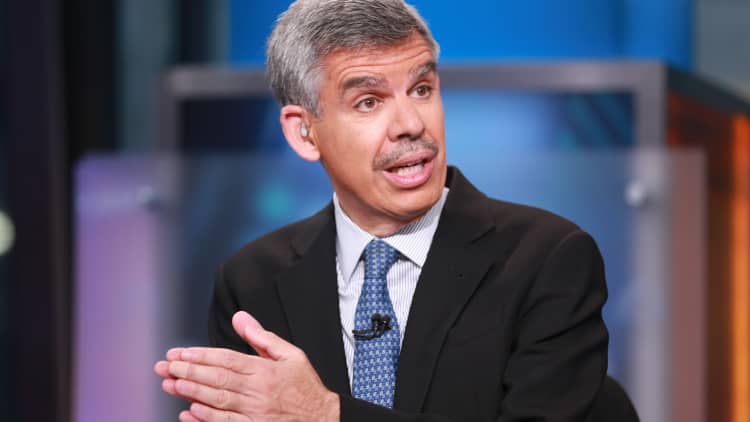
Even though the Federal Reserve has opened the discussion about what to do with its nearly $4.5 trillion balance sheet at the same time as increasing interest rates, politics rank as the top risk for financial markets, Allianz's chief economic advisor, Mohamed El-Erian, told CNBC on Monday.
"The biggest wild card is the politics. It's really important here, Europe, Middle East, North Korea. There's a lot of moving pieces," the former Pimco co-CEO said in a "Squawk Box" interview. "The second-biggest wild card is the reaction of the economy to years and years of low, noninclusive growth."
Maneuvering by President Donald Trump and Republican leaders on Capitol Hill holds the key to whether promised pro-growth policies, such as tax cuts and deregulation, become reality and help boost the economy or fall short and hurt the economy, El-Erian said.
"The critical thing for investors to realize is it's become much more binary," he said. "The new normal is becoming the least likely outcome in the next two years. We're going to pivot one way or another."
After the financial crisis, El-Erian at Pimco coined "the new normal" to describe a low economic growth environment with high unemployment and government debt problems.
Trying to boost growth and reduce unemployment, the Fed's accommodative monetary policy since the crisis and how long it might last has been the obsession of markets in recent years.
But now that the Fed has a few rate hikes under its belt, the most recent move at the March policy meeting, and expectations for a total of three in 2017, the central bank has become less of a risk, El-Erian said.

Policymakers moved the fed funds rate to a range of zero to 0.25 percent in December 2008. After seven years of holding steady, the Fed raised rates in December 2015, December 2016 and March 2017, in three quarter-point moves.
Last week, in the minutes of the March Fed meeting, it was revealed that central bankers talked about how to address the balance sheet, which has soared more than four-fold since the 2008 financial crisis to just under $4.5 trillion through multiple rounds of quantitative easing, bond
Talking to reporters in Australia on Monday, St. Louis Fed President James Bullard said opinions differed within the Fed on ending its balance sheet reinvestment policy, but he felt it could start later in the year. Bullard emphasized the central bank would not be actively selling assets, but rather not replacing them as they mature.
El-Erian said he would advise the Fed to hold off on shrinking its massive balance sheet until rates are lifted back to more historically normal levels.
"I don't think you want too many moving pieces right now. There's enough moving the global economy," he said. "Normalize rates first, and do the balance sheet as a second step."
Ultimately, though, El-Erian said he believes the Fed "will adapt" to evolving conditions and stave off any profound financial market volatility. He said the same is unlikely to be true of politics.
— Reuters contributed to this story.


